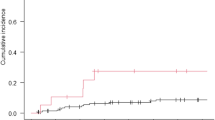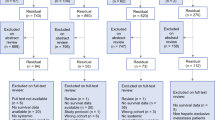Abstract
Purpose
We aimed to assess the safety and efficacy of transarterial chemoembolization (TACE) with doxorubicin-loaded CalliSpheres® beads (DEB-TACE) for the treatment of patients with inoperable or recurrent colorectal cancer (CRC).
Methods
This retrospective study recruited 12 consecutive patients with histology confirmation of CRC who received DEB-TACE between August 2017 and April 2020. There were 9 male and 3 female, with a mean age 62.5 ± 14.9 (range 29–84). Patients’ characteristics, medical imaging data, complications and DEB-TACE procedure were retrospectively reviewed. The disease control rate was defined as the sum of complete response, partial response and stable disease.
Results
DEB-TACE was successfully performed in all patients. All patients showed local disease control 1 month after DEB-TACE. Disease control rates were 90.9% and 70.0% at 3 and 6 months after DEB-TACE procedure, respectively. Disease-free interval was 11.0 to 81.8 months. Five patients (41.7%) received prior chemotherapy treatments. No severe complications or procedure-related deaths were observed. The median overall survival was 15.9 months, and median progression-free survival was 13.4 months.
Conclusion
DEB-TACE is a safe and effective treatment and could be a option for patients with inoperable or recurred CRC.



Similar content being viewed by others
Data availability
For further details, the corresponding author can be contacted.
References
Benson AB, 3rd, Venook AP, Cederquist L, et al. (2017) Colon cancer, version 1.2017, nccn clinical practice guidelines in oncology. Journal of the National Comprehensive Cancer Network : JNCCN 15(3):370-398.
Van Cutsem E, Cervantes A, Adam R, et al. (2016) Esmo consensus guidelines for the management of patients with metastatic colorectal cancer. Annals of oncology : official journal of the European Society for Medical Oncology 27(8):1386-1422.
Benson AB, Venook AP, Al-Hawary MM, et al. (2018) Nccn guidelines insights: Colon cancer, version 2.2018. Journal of the National Comprehensive Cancer Network : JNCCN 16(4):359-369.
Xiang H, Long L, Yao Y, Fang Z, Zhang Z, Zhang Y (2019) Callispheres drug-eluting bead transcatheter arterial chemoembolization presents with better efficacy and equal safety compared to conventional tace in treating patients with hepatocellular carcinoma. Technol Cancer Res Treat 181533033819830751.
Zhou GH, Han J, Sun JH, et al. (2018) Efficacy and safety profile of drug-eluting beads transarterial chemoembolization by callispheres(r) beads in chinese hepatocellular carcinoma patients. BMC Cancer 18(1):644.
Lewis AL, Holden RR (2011) DC Bead embolic drug-eluting bead: clinical application in the locoregional treatment of tumours. Expert opinion on drug delivery 8:153-169.
Masi G, Falcone A, Di Paolo A, Allegrini G, Danesi R, Barbara C, Cupini S, Del Tacca M (2004) A phase I and pharmacokinetic study of irinotecan given as a 7-day continuous infusion in metastatic colorectal cancer patients pretreated with 5-fluorouracil or raltitrexed. Clinical cancer research : an official journal of the American Association for Cancer Research 10:1657-1663.
Kurilova I, Beets-Tan RGH, Flynn J, et al. (2019) Factors affecting oncologic outcomes of 90y radioembolization of heavily pre-treated patients with colon cancer liver metastases. Clinical colorectal cancer 18(1):8-18.
Wasan HS, Gibbs P, Sharma NK, et al. (2017) First-line selective internal radiotherapy plus chemotherapy versus chemotherapy alone in patients with liver metastases from colorectal cancer (foxfire, sirflox, and foxfire-global): A combined analysis of three multicentre, randomised, phase 3 trials. The Lancet Oncology 18(9):1159-1171.
Melchiorre F, Patella F, Pescatori L et al (2018) DEB-TACE: a standard review. Future Oncol 14:2969-2984.
Wu B, Zhou J, Ling G, Zhu D, Long Q (2018) CalliSpheres drug-eluting beads versus lipiodol transarterial chemoembolization in the treatment of hepatocellular carcinoma: a short-term efficacy and safety study. World J Surg Oncol 16:69.
Eisenhauer EA, Therasse P, Bogaerts J, et al. (2009) New response evaluation criteria in solid tumours: Revised recist guideline (version 1.1). Eur J Cancer 45(2):228-247.
Rosen SA, Buell JF, Yoshida A, Kazsuba S, Hurst R, Michelassi F, Millis JM, Posner MC (2000) Initial presentation with stage IV colorectal cancer: how aggressive should we be? Archives of surgery 135:530-534; discussion 534-535.
Greenlee RT, Murray T, Bolden S, Wingo PA (2000) Cancer statistics, 2000. CA Cancer J Clin 50:7-33.
Simmonds PC (2000) Palliative chemotherapy for advanced colorectal cancer: systematic review and meta-analysis. Colorectal Cancer Collaborative Group. Bmj 321:531-535.
Gu J, Ma ZL, Li Y, Li M, Xu GW (2003) Angiography for diagnosis and treatment of colorectal cancer. World J Gastroenterol 9:288-290.
Xu J, Zhong Y, Weixin N, Xinyu Q, Yanhan L, Li R, Jianhua W, Zhiping Y, Jiemin C (2007) Preoperative hepatic and regional arterial chemotherapy in the prevention of liver metastasis after colorectal cancer surgery. Ann Surg 245:583-590.
Bini R, Comelli S, Leli R, Vaudano GP, Savio D, Viora T, Addeo A (2016) A novel approach to inoperable or recurrent rectal cancer by chemoembolization: A new arrow in our quiver? Oncotarget 7:45275-45282.
Funding
None.
Author information
Authors and Affiliations
Contributions
Concept and design: XH and MS; Data collection: YB and XS; Manuscript drafting: JR and MY; Statistical analysis: XS, JR and MY; Administrative support: XH and MS; All authors discussed the results and revised the manuscript.
Corresponding authors
Ethics declarations
Conflict of interest
None of the authors has any conflict of interest to disclose.
Ethics approval
This study was approved by the Ethics Committee of The First Affiliated Hospital of Zhengzhou University. Written informed consents were obtained from all patients.
Informed consent
Written informed consents were obtained from the patients for publication. A copy of the written consent is available for review by the Editor of this journal.
Additional information
Publisher's Note
Springer Nature remains neutral with regard to jurisdictional claims in published maps and institutional affiliations.
Rights and permissions
About this article
Cite this article
Bi, Y., Shi, X., Ren, J. et al. Transarterial chemoembolization with doxorubicin-loaded beads for inoperable or recurrent colorectal cancer. Abdom Radiol 46, 2833–2838 (2021). https://doi.org/10.1007/s00261-020-02877-w
Received:
Revised:
Accepted:
Published:
Issue Date:
DOI: https://doi.org/10.1007/s00261-020-02877-w




